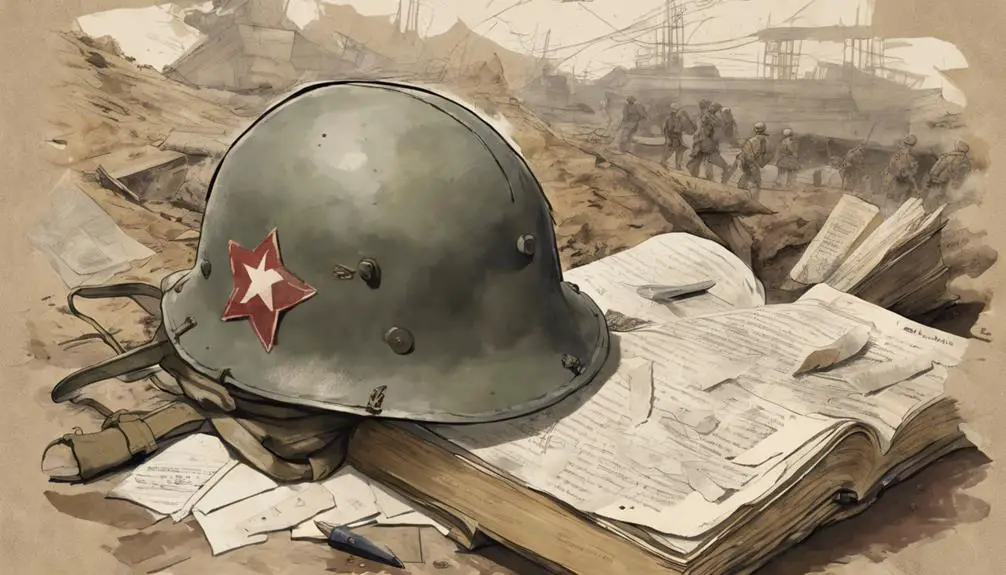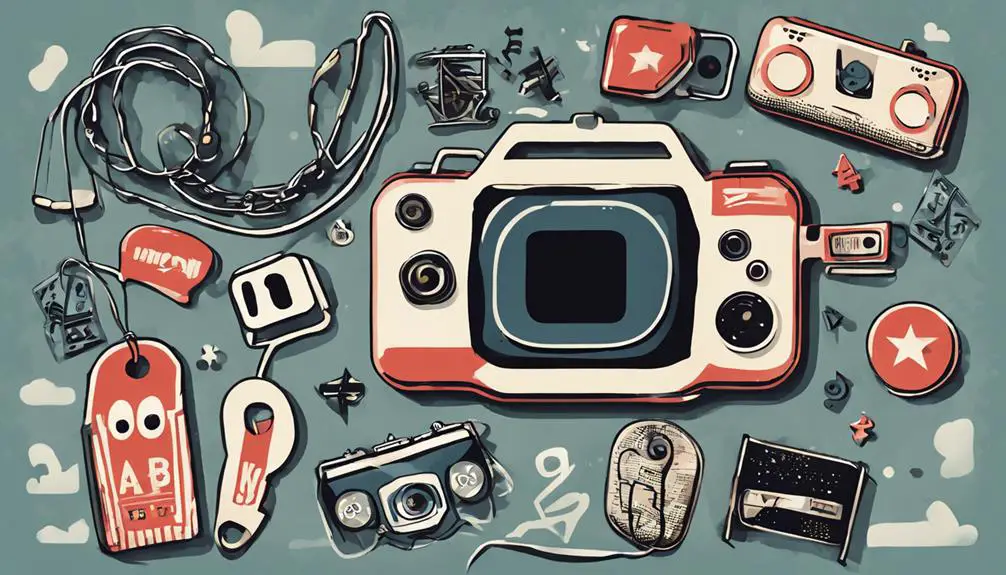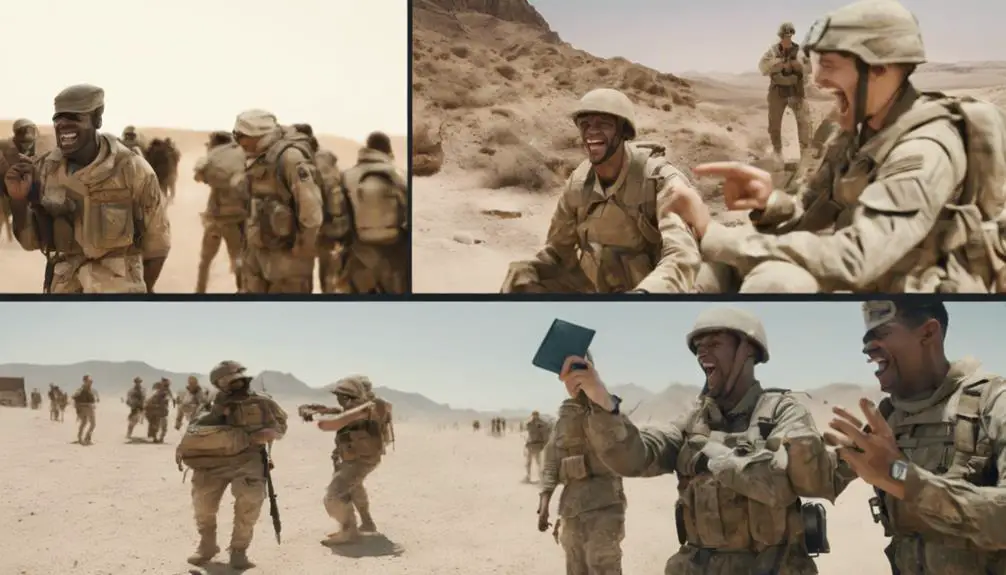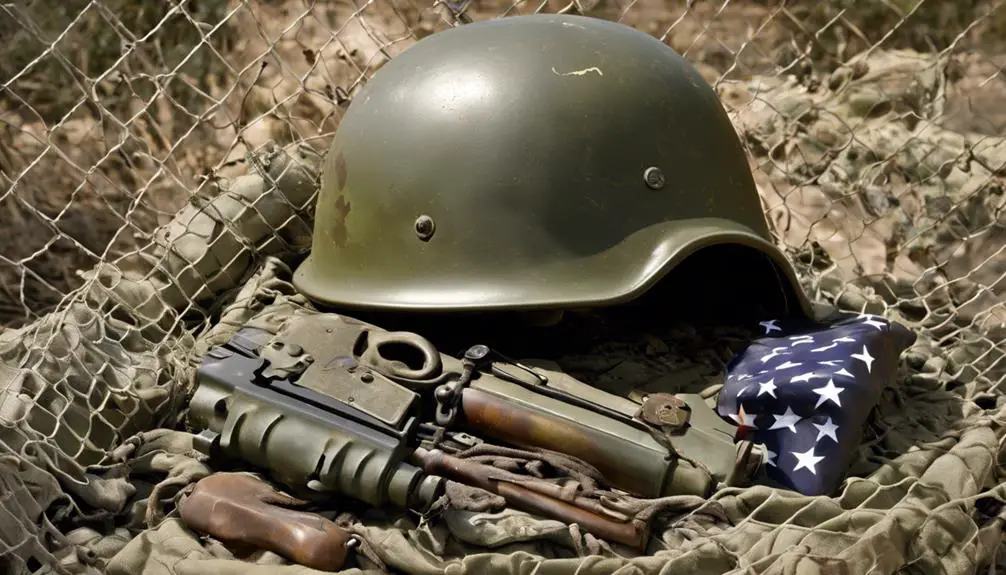You're about to enter the complex world of military slang, where brevity and clarity are a matter of life and death. From "Oscar Mike" to "SITREP," you'll realize that military slang is more than just a casual colloquialism – it's acoded language born out of necessity. With roots in historical context and cultural influences, military slang has evolved to prioritize efficiency and precision. Each branch has its unique flavor, and its usage extends beyond the battlefield into pop culture. You're just scratching the surface – there's a whole lexicon waiting to be deciphered, and the more you explore, the more you'll uncover the intricate nuances of this coded world.
Origins of Military Slang

You're about to explore a linguistic jungle that's been shaped by centuries of warfare, cultural clashes, and the need for secrecy: the origins of military slang. Buckle up, because this journey takes you through the etymological roots of words that'll make you sound like a seasoned vet.
Historical context plays a significant role in shaping military slang. In the midst of chaos, soldiers turned to colloquialisms to communicate quickly and discreetly. The need for secrecy drove the creation of coded language, allowing troops to convey critical information without tipping off the enemy. Take 'copacetic,' for instance, which originated in the Civil War era. This slang term, meaning 'all right' or 'fine,' was used to signal that everything was, well, copacetic.
Delving deeper, you'll find that military slang often borrowed from other languages, reflecting the cultural clashes that defined various conflicts. From 'boondock' ( Filipino for 'mountain') to 'cumshaw' (Chinese for 'gratuity'), the etymological roots of these words reveal a complex web of cultural exchange.
As you venture further into this linguistic jungle, remember that military slang is more than just a quirky dialect – it's a reflection of humanity's capacity for creativity and resilience under fire.
Communication in the Trenches
How did soldiers in the trenches communicate effectively amidst the chaos and noise of war, when a misheard order or misunderstood signal could mean the difference between life and death? You'd be surprised at the creative ways they got their point across.
Code switching, for instance, was a lifesaver. Soldiers would alternate between formal and informal language to convey different types of information. Formal language was used for official orders, while informal language was used for casual conversations. This switching helped to avoid confusion and made sure that critical information was conveyed accurately.
Radio etiquette was also vital. You wouldn't shout into the radio, for instance. You'd use a calm, clear tone to avoid distortion or misinterpretation. And, of course, you'd use approved call signs and frequencies to avoid confusion or detection by the enemy.
It's amazing how something as simple as clear communication can be the difference between success and failure in the heat of battle. But hey, when your life depends on it, you learn to communicate effectively – or you don't survive.
Acronyms and Abbreviations

In the chaos of war, acronyms and abbreviations became an essential crucial shorthand, allowing soldiers to convey complex information quickly and accurately, with minimal risk of miscommunication.
You might be wondering what FOUO stands for – it's 'For Official Use Only,' a classification that's not exactly top-secret, but not exactly public knowledge either. Decoding these abbreviations is a critical skill for anyone in the military.
The evolution of abbreviations has been quite a journey – from the early days of Morse code to the modern era of texting abbreviations, the military has adapted to new communication methods.
You'll encounter a plethora of acronyms in the military, from ASAP (As Soon As Possible) to SOP (Standard Operating Procedure). It's not just about brevity; it's about clarity in high-stress situations.
When every second counts, using the right abbreviation can make all the difference. So, the next time you're trying to decipher a military message, remember that it's not just jargon – it's a language that's been honed for efficiency and precision.
Slang of the Different Branches
Each branch of the military has its own unique slang, shaped by their distinct cultures and histories, with the Army's 'hooah' and the Navy's 'deck ape' being just a couple examples of the colorful language that defines their respective identities.
You might find yourself wondering, what's the deal with the different branch vernaculars? It's not just about being cool (although, let's be real, it's pretty cool). Each branch has its own service idioms that have evolved from their unique experiences and traditions. Take a look at some examples:
- The Army's 'hooah' is an all-purpose expression of enthusiasm or agreement.
- The Navy's 'deck ape' refers to a sailor who's a bit of a troublemaker.
- The Air Force's 'beyond the flagpole' means something is so obvious, it's like it's right in front of you.
- The Marines' 'oorah' is similar to the Army's 'hooah', but with a more, well, Marine-y flair.
- The Coast Guard's 'coastie' is a term of endearment for, well, a member of the Coast Guard.
Each branch has its own distinct flavor, shaped by their history, culture, and quirks. So, the next time you're chatting with a vet, try dropping some branch-specific slang – just don't try to fake it, or you'll be pegged as a poser.
Military Slang in Pop Culture

You've likely caught military slang slipping into your favorite TV shows and movies, with characters tossing around 'HOOAH' and 'OSCAR MIKE' like they're going out of style. It's no surprise, really – military culture has long been a source of fascination for the general public. Cinematic portrayals of military life often rely on slang to add authenticity to the dialogue.
Take, for example, the iconic film 'Platoon,' where characters casually drop terms like 'grunt' and 'FOB.' It's not just movies, either – TV shows like 'SEAL Team' and 'The Unit' frequently feature characters using military slang to communicate.
But military slang's influence doesn't stop at the screen. Musical references to military culture are also on the rise. Rappers like J. Cole and Travis Scott have name-dropped military terminology in their lyrics, while punk bands like The Exploited have long used military imagery in their aesthetics.
Even in advertising, military slang is being used to sell everything from energy drinks to tactical gear. It's clear that military slang has become an integral part of popular culture – and it's not going anywhere anytime soon.
Deciphering Military Jargon
Immerse yourself in any military conversation, and you'll quickly realize that deciphering military jargon is like cracking a secret code, requiring a crash course in alphabet soup acronyms and obscure terminology that'll leave civilians scratching their heads.
Code breaking, anyone? As a civilian, it's like trying to speak a foreign language. But don't worry, with some Jargon Busters, you'll be well on your way to becoming a master decoder. Here are a few tips to get you started:
- Familiarize yourself with common acronyms: You'll hear terms like 'SITREP' (situation report) and 'ROE' (rules of engagement) thrown around like they're going out of style.
- Learn military-specific terminology: Words like 'hooah' (a general expression of excitement or agreement) and 'FOB' (forward operating base) will have you sounding like a pro in no time.
- Pay attention to context: If you're unsure what someone means, try to pick up on subtle cues from the conversation.
- Don't be afraid to ask: If all else fails, just ask the speaker to clarify – they'll appreciate your honesty.
- Practice, practice, practice: The more you engage with military jargon, the more comfortable you'll become with the lingo.
Lost in Translation

When military slang meets everyday conversation, the result is often a confusing mess that leaves civilians bewildered and military personnel chuckling at the misunderstandings. You've probably been there – trying to decipher what your military friend is saying, only to end up with a confused expression on your face. That's because military slang is a language all its own, with cultural barriers and language faux pas lurking around every corner.
| Military Slang | Civilian Translation |
|---|---|
| 'Oscar Mike' | 'On the move' |
| 'SITREP' | 'Situation Report' |
| 'ROE' | 'Rules of Engagement' |
| 'EOD' | 'Explosive Ordnance Disposal' |
| 'FOB' | 'Forward Operating Base' |
Don't worry, it's not you – it's just a language gap. Military personnel often forget that not everyone speaks 'military.' And let's be real, it's pretty entertaining to watch civilians try to keep up with the lingo. But in all seriousness, understanding military slang can be a key part of bridging the cultural divide between military and civilian life. So, take a deep breath, and let's immerse ourselves in the world of military slang – where 'hurry up and wait' is a way of life.
Frequently Asked Questions
Can Military Slang Be Used in Formal Military Writing?
You're wondering if you can get away with using colloquialisms in formal military writing. Sorry, but no. A formal tone demands precision, not casual slang.
Writing standards are in place for a reason – clarity and professionalism. Save the informal jargon for barracks banter, not official documents.
Is Military Slang Unique to the US Military Only?
'When in Rome, do as the Romans do,' but when it comes to military slang, you might think it's a uniquely American thing.
Think again. A cross-cultural comparison reveals that military slang is a global phenomenon, with armies worldwide coining their own colloquialisms.
Historical evolution shows that slang has been around since ancient times, with each culture adding its own flavor.
Are All Military Slang Terms Officially Recognized?
You're wondering if all military slang terms are officially recognized? Let's get real, most slang originates from the streets, not some fancy Pentagon office.
Slang origins are often murky, and official classification is rare. The military doesn't officially sanction most slang terms, and it's unlikely they'd bother to recognize every made-up phrase soldiers use.
Can Civilians Use Military Slang in Everyday Conversation?
'Actions speak louder than words,' right?
So, can you use military slang in everyday conversation? Go for it, but be aware of cultural appropriation.
Linguistic evolution happens, and social norms shift. Yet, language barriers and verbal cues can lead to misunderstandings.
Be respectful, and don't pretend to be something you're not. Use slang thoughtfully, and you'll avoid being 'that guy' who's trying too hard.
Just remember, it's not about the words, it's about the intention behind them.
Is Military Slang Used in International Military Operations?
You're wondering if military slang is used in international military operations?
Let's get real, when you're working with coalition forces, clear communication is key. You can't have troops from different countries throwing around slang terms like they're at a frat house. Coalition communication requires precision, not colloquialisms.
Cross-cultural barriers are already a challenge; adding slang to the mix would be a recipe for disaster.
Conclusion
You've made it through the trenches of military slang, but don't think you're fluent just yet. You've only scratched the surface of this linguistic battlefield.
Remember, in the military, phrases can be as slippery as a snake in the grass – they can change meaning faster than a drill sergeant can yell 'dropped and gave me twenty!'
So, stay vigilant, stay curious, and don't get left in the dust.







